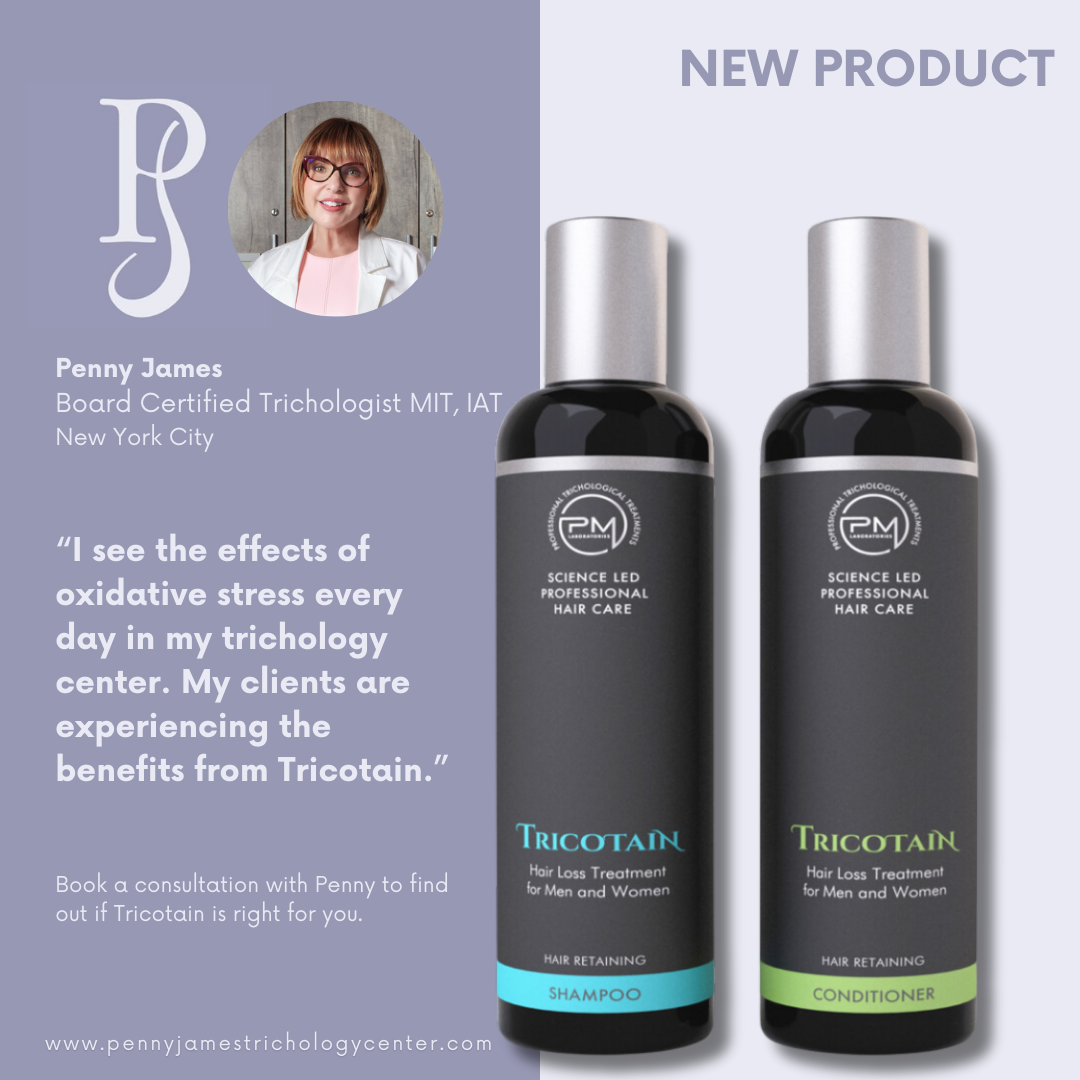Trichology Insights on Nutritional Wellness to Prevent Hair Loss
Navigating hair loss conditions is complex. There is an interplay of various elements that contribute to the health of hair and the functioning of hair follicles. It can be influenced by a combination of genetic, hormonal, environmental, and lifestyle factors. Inadequate nutrition, especially deficiencies in vitamins, minerals, and amino acids, can also contribute to hair loss.
The saying, “We are what we eat” is not just a cliche, but a significant fact for how we can maintain our overall health and wellness. One of the most important things we can do is offer our body nutritious foods to promote better health. It will boost our immunity, help us balance our hormones, and keep our body (and hair) strong.
As a board-certified trichologist with a center in New York City, I work with clients to take a homeopathic approach to hair loss. One such way is to support my clients in understanding how amino acids, vitamins, minerals, and other forms of nutrition are essential to their hair health.
What We Know About Hair Loss
Hair loss is not solely caused by DHT (dihydrotestosterone), a hormone most often associated with male characteristics (though it is present in women at lower levels). Oxidative stress also plays a significant role in potential hair loss. DHT is formed when testosterone is converted with the help of the 5-alpha reductase enzyme. This conversion triggers the release of NADPH Oxidase, a powerful oxidizing enzyme, onto the dermal papilla (part of the hair follicle). The oxidative stress caused by this process damages fast-growing hair cells, hindering normal hair growth. Over time, this damage can result in hair becoming shorter and thinner, and, in severe cases, may lead to a complete cessation of hair growth.
Given the multifaceted nature of hair loss, navigating the issue often requires a comprehensive approach, involving a combination of lifestyle modifications, nutritional support, medical interventions, and personalized care based on the specific underlying causes. Several types of hair loss necessitate different treatment plans. Trichologists will assess and diagnose hair loss causes, offering holistic solutions based on scientific evidence.
Amino Acids for Hair Health
Amino acids, known as the building blocks of proteins, are crucial for the formation and maintenance of our hair's structure. These building blocks support the growth and maintenance of hair and scalp health, while deficiencies or imbalances can contribute to conditions leading to hair loss.
Obtaining the nine essential amino acids (histidine isoleucine, lysine, leucine, methionine, phenylalanine, threonine, tryptophan, and valine) comes through our diet, as our bodies do not produce them naturally. Methionine, specifically, provides sulfur for hair structure and is involved in the synthesis of keratin. Lysine is essential for the synthesis of collagen which promotes healthy hair and skin. Maintaining a healthy diet with a variety of protein sources is the best way to ensure adequate intake of all essential amino acids.
But we can’t overlook the non-essential amino acids (alanine, arginine, asparagine, aspartic acid, cysteine, glutamic acid, glutamine, glycine, proline, serine, and tyrosine). Though our body naturally produces these, it doesn’t mean we don’t need to be mindful to keep them in supply. Arginine, in particular, supports blood circulation to the hair follicles, contributing to hair growth. It is especially crucial for children’s development, along with histidine. Cystine, like methionine, is another sulfur-containing amino acid that bonds with keratin to strengthen the hair.
There are certain food groups that offer you these amino acids and will contribute to optimal hair and follicle health. For example, avocados, beans, broccoli, and spinach contain proline, while salmon, sardines, cod, and nuts are rich in lysine. Cystine is found in pork, whole grains, chicken, fish, and eggs. There are many other options but I have found this group of proteins very helpful to keeping the scalp healthy and the hair growth stronger.
L-Tyrosine, an amino acid that serves as a precursor to melanin, is also often utilized to treat autoimmune issues that impact the hair and scalp by modulating the immune system. Psoriasis and seborrheic dermatitis are just two of the scalp conditions that L-Tyrosine has been beneficial for. One supplement I recommend to my clients for L-Tyrosine is Tricotaine. This daily multivitamin is backed by David Salinger, the Director of IAT, to reduce swelling around hair follicles when taken twice daily between meals.
Vitamins and Minerals for Hair Health
Several vitamins play critical roles in maintaining overall hair health and preventing conditions that lead to hair loss. They contribute to the synthesis of essential proteins, provide antioxidant protection against oxidative stress, and help regulate factors like oil production and hydration that influence the condition of the scalp and hair follicles.
Monitoring your vitamin intake, especially Vitamin B6 and B12, is particularly important for vegans and vegetarians to prevent deficiences that could impact hair health. Deficiencies in B Vitamins can lead to hair thinning. Additionally, vitamin C, E, A, and D are vital, with vitamin C and zinc forming a potent antioxidant combination and supporting collagen production. Deficiencies in vitamin A or zinc are associated with dry hair and oily skin.
Let’s not forget the importance of iron, a mineral that helps the oxygenation of hair follicles and the transportation of nutrients to the hair roots. Low iron leads to insufficient oxygen supply to the hair follicles, contributing to hair thinning and loss. Patients with anemia have been known to have hair-related issues, so dark, leafy greans, nuts and seeds, and fish are some foods to add to your diet.
A diverse diet that includes fruits, vegetables, whole grains, lean proteins, and dairy or plant-based alternatives can help ensure an adequate intake of these vitamins and minerals. In some cases, dietary supplements may be recommended, especially for people with specific dietary restrictions or those at risk of deficiencies.
Other Dietary Factors for Hair Health
Small lifestyle changes go a long way to promote better hair health and prevent possible hair loss. Though amino acids, vitamins, and minerals are some of the essential ways to do this, there are other factors you can take into consideration.
Staying hydrated is important for overall health, including that of the scalp and hair follicles. A well-hydrated scalp microbiome is less likely to experience dryness, flakiness, or excessive oiliness that could impact the hair growth cycle.
Another way to support scalp health is through omega-3 fatty acids found in fish, flaxseeds, and walnuts. These types of acids can offer the scalp more hydration, reduce inflammation, and support the production of essential hair proteins like keratin. Adequate intake of omega-3 fatty acids may help prevent hair loss by cultivating a healthy environment for hair follicles and improving the strength and quality of hair strands.
Excessive sugar and processed foods can contribute to scalp inflammation, negatively impacting the hair growth cycle. Avoid foods that have undergone significant alternations from their original form like fast food and sugary beverages with addened sweeteners.
And don’t forget your antioxidants to help protect hair follicles from oxidative stress. These compounds neutralize harmful free radicals and protect from potential damage. By supporting scalp health, improving blood circulation, and preventing premature aging of hair, antioxidents are a great way to promote hair health.
My Hair Loss Product Recommendation
I’ve owned and ran Penny James Trichology Center since 2013, which means I have seen the effects of oxidative stress among countless clients dealing with hair loss and other scalp conditions. I only recommend products backed by science and intensively studied for their effectiveness. Tricotain is one product that has offered amazing benefits to the people I work with.
Tricotain shampoo is designed for individuals concerned about hair loss, scalp health, or those experiencing thinning and shedding. It addresses various hair loss conditions, including male and female pattern hair loss, androgenic alopecia, hormonal fluctuation-related hair shedding, autoimmune and scarring hair loss (Frontal Fibrosing Alopecia), as well as post-hair transplant surgery care for individuals using minoxidil and finasteride.
The product is backed by the latest scientific research and is antioxidant-balanced. Tricotain helps combat oxidative stress on the hair and scalp, reducing it with each wash. The shampoo contains a complex mixture of powerful antioxidants and free radical scavengers formulated to neutralize and prevent the destructive free radicals causing hair loss. Due to its active ingredients, Tricotain penetrates deep into the hair follicle, fighting oxidative stress around the dermal papilla. The benefits include maintaining hair follicle health, reducing inflammation, and ensuring the scalp is in optimum condition for new hair growth.
A Trichologist Can Support Your Hair Health Journey
A trichologist is a specialized healthcare professional who focuses on the study of hair and scalp conditions. We assess, diagnose, and treat various issues related to hair and scalp health, providing personalized recommendations and interventions for people experiencing hair loss or other related concerns.
At my center, I pride myself on offering clients honest, fact-based results. One thing I will never do is sugar-coat your diagnosis. One thing I will always do is offer you solutions that can offer you relief. If your diagnosis is beyond the realm of my expertise, I have a network of highly-regarded specialists to refer you to. All of the products I offer you are backed by some of the world’s leading trichologists and specialists, created by scientists who know the importance of safe and effective solutions.
Book a consultation with me now for a scalp analysis. I provide a safe space for clients to address their hair and scalp issues.





